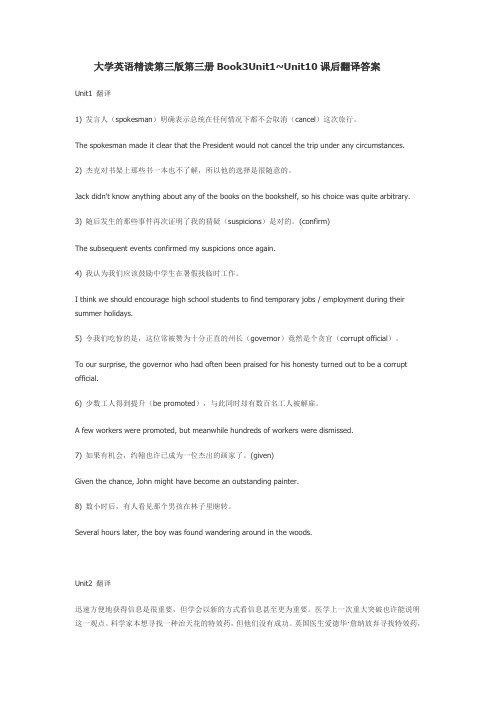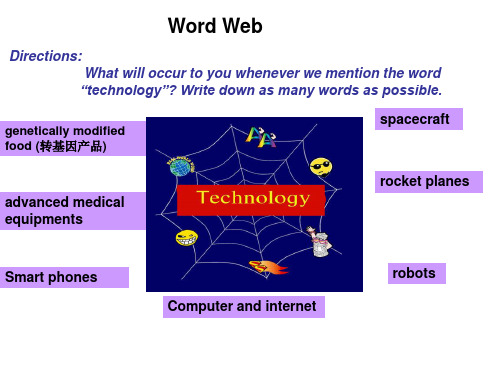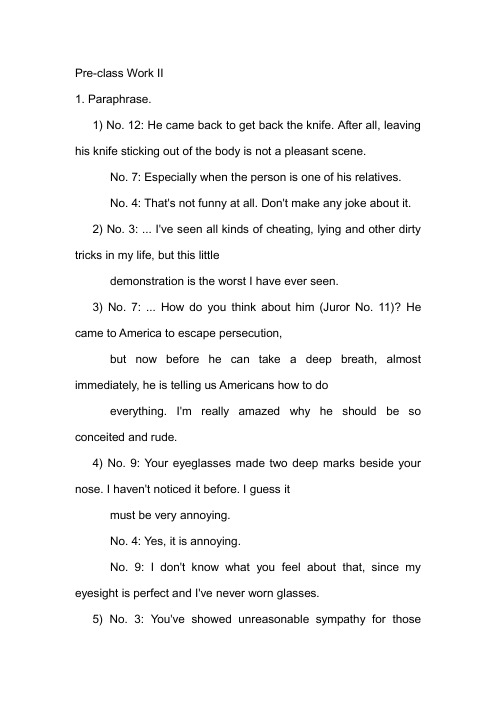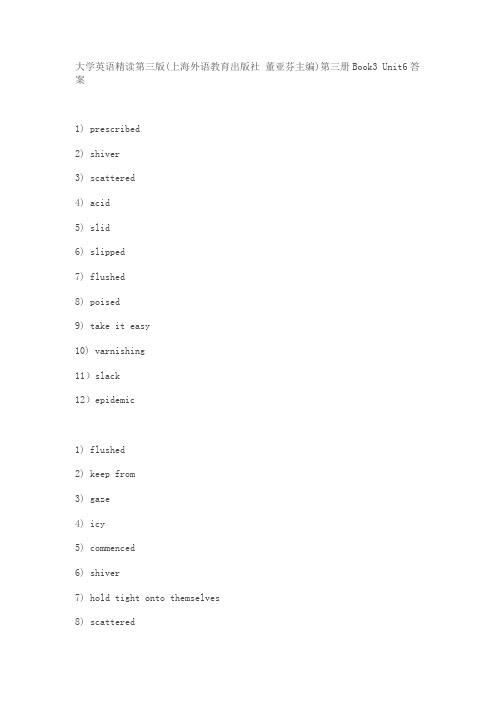大学英语精读(第三版)unit 6-10教案
现代大学英语精读1(第三版)教师用书Unit1

现代大学英语精读1(第三版)教师用书Unit1:走进英语学习的奇妙世界一、教学目标1. 帮助学生掌握本单元的核心词汇和短语,提高英语表达能力。
2. 引导学生理解课文内容,培养阅读理解能力。
3. 通过课文学习,激发学生对英语国家文化的兴趣。
4. 培养学生运用英语进行思考和讨论的能力。
二、教学内容1. 词汇:本单元涉及约50个核心词汇,包括生活、学习、工作等场景的高频词汇。
2. 短语:学习10个常用短语,帮助学生更好地表达自己的想法。
3. 课文:解读课文《A Good Beginning》,让学生了解英语学习的乐趣和方法。
4. 文化背景:介绍英语国家的教育体制,拓宽学生视野。
三、教学步骤1. 导入:以趣味话题引入本单元主题,激发学生兴趣。
2. 词汇讲解:结合实例,讲解核心词汇的用法和搭配。
3. 短语学习:通过情景模拟,让学生在实际语境中掌握短语用法。
4. 课文解读:带领学生分析课文结构,理解文章主旨。
5. 文化拓展:分享英语国家的教育趣事,让学生感受异国文化。
6. 讨论环节:组织学生就课文内容展开讨论,提高英语口语表达能力。
7. 作业布置:巩固所学知识,为下一节课做好准备。
四、教学建议1. 针对不同水平的学生,适当调整教学难度和进度。
2. 创设生动、有趣的教学情境,提高学生的学习积极性。
3. 注重培养学生的自主学习能力,鼓励学生课外阅读英语文章。
4. 定期进行课堂互动,关注学生的发音、语法等细节问题。
5. 结合实际生活,让学生在实践中感受英语的魅力。
五、教学方法1. 互动式教学:采用提问、小组讨论等形式,让学生在互动中学习,提高课堂参与度。
2. 情境模拟:通过角色扮演、情景对话等方式,让学生在真实语境中运用所学知识。
3. 任务驱动:设计一系列学习任务,引导学生主动探索、解决问题,培养解决问题的能力。
4. 多媒体辅助:利用音频、视频等资源,丰富教学手段,提高学生的学习兴趣。
六、课堂活动设计1. 词汇接龙:让学生轮流用本单元学到的词汇进行接龙,巩固记忆。
大学英语精读第三版(董亚芬)第三册1-10单元课后翻译答案

大学英语精读第三版第三册Book3Unit1~Unit10课后翻译答案Unit1 翻译1) 发言人(spokesman)明确表示总统在任何情况下都不会取消(cancel)这次旅行。
The spokesman made it clear that the President would not cancel the trip under any circumstances.2) 杰克对书架上那些书一本也不了解,所以他的选择是很随意的。
Jack didn't know anything about any of the books on the bookshelf, so his choice was quite arbitrary.3) 随后发生的那些事件再次证明了我的猜疑(suspicions)是对的。
(confirm)The subsequent events confirmed my suspicions once again.4) 我认为我们应该鼓励中学生在暑假找临时工作。
I think we should encourage high school students to find temporary jobs / employment during their summer holidays.5) 令我们吃惊的是,这位常被赞为十分正直的州长(governor)竟然是个贪官(corrupt official)。
To our surprise, the governor who had often been praised for his honesty turned out to be a corrupt official.6) 少数工人得到提升(be promoted),与此同时却有数百名工人被解雇。
A few workers were promoted, but meanwhile hundreds of workers were dismissed.7) 如果有机会,约翰也许已成为一位杰出的画家了。
大学英语精读第三册Unit 10 the fantastic spurt in technology

Assembly Line
The assembly line is a system of manufacturing in which each worker performs a specialized operation on an unfinished product as it is moved past his or her station by a conveyor. (流水装配线)
1954
Symbols of technology in the 21st century • Television—but smarter
Symbols of technology in the 21st century
• Computer & Internet
Symbols of technology in the 21st century
Symbols of technology in the 21st century
• Google glass—Google’s wearable computer. An evolution of the smartphone. It allows you to use verbal commands to browse the internet, take pictures, send messages and more.
的确安静和洁净的工作环境是电子技术太空技术以及大部分新工业的特点在今天最先进的技术工艺是在流水作业线或鼓风炉的操作截然不同
Word Web
Directions: What will occur to you whenever we mention the word “technology”? Write down as many words as possible.
大学英语精读第三版预备级教案1-6单元

IntensiveReading: Unit2A father, a Son and an Answer
ExtensiveReading: Unit2Culture and Recreation
授课方式
The course emphasizes the application of targeted language skills and English expressions through class activities such as group discussions, answering content-based questions,comparative translationand doing a reasonable amount of drill work both in and outside the classroom. (强调应用)
e the structure learned in this unitbydoing drills anddeveloping astructured mini speech
难点
1.Summarize the content in their own languages.
2.Talk abouttheir own English learning experiences and thencomment
6. Read Text B on their own andwith the teacher’s assistancedo the exercisesattached.
7. Summarize Text B in their own languages.
8.Read the4essays inUnit 1Campus Lifeand answertherelated questions.
现代大学英语精读3_unit_6课后答案

Pre-class Work II1. Paraphrase.1) No. 12: He came back to get back the knife. After all, leaving his knife sticking out of the body is not a pleasant scene.No. 7: Especially when the person is one of his relatives.No. 4: That's not funny at all. Don't make any joke about it.2) No. 3: ... I've seen all kinds of cheating, lying and other dirty tricks in my life, but this littledemonstration is the worst I have ever seen.3) No. 7: ... How do you think about him (Juror No. 11)? He came to America to escape persecution,but now before he can take a deep breath, almost immediately, he is telling us Americans how to doeverything. I'm really amazed why he should be so conceited and rude.4) No. 9: Your eyeglasses made two deep marks beside your nose. I haven't noticed it before. I guess itmust be very annoying.No. 4: Yes, it is annoying.No. 9: I don't know what you feel about that, since my eyesight is perfect and I've never worn glasses.5) No. 3: You've showed unreasonable sympathy for thosepeople. How terrible you all are. Are you goingto frighten me not to vote him guilty? You can't. I have the right to h01d my own point.2, Learn to use reference books.Find the correct definition of the following in the text.1) figure: to think; to guess2) beat: to arrive at the very spot3) bear: to prove4) stamp: to keep lifting each foot and bringing it down again very hard to make a noise5) room: chance6) term: a word or expression that has a particular meaning7) bridge: a card game for four players who play in pairs8) feature: a film being shown at a cinema9) tie: the result of a game, competition, or election in which two or more people get the same number ofpoints, votes, etc.10) impressions: marks3. Find the synonyms of the following in a thesaurus.1) crazy: insane, mad, unbalanced2) to bother : to annoy, to trouble, to dismay, to worry, to disquiet, to disturb, to upset, to plague, to try4. Word-building.I) Give the corresponding nouns of the following.(1) vote (2) assumption (3) dependence(4) risk(5) objection (6) recreation (7) declaration(8) obscurity(9) plunge (10) description (11) annoyance (12) intimidation2) Give the corresponding verbs of the following.(1)to detect (2) to relate (3) to doubt (4) to differ(5) to display (6) to execute (7) to stress(8) to breathe(9) to disgust (10) to narrate (11) to switch3) Translate the following using your acquired rules of word-building and point out which "-ing"form denotes a gerund and which a present participle. Participles: (2), (4), (6), (8), (11), (12), (13), (15), (16), (17), (18), (20), (21), (22), (23), (24), (25), (26), (27),(28), (30), (31), (32), (34), (39), (40), (42), (44), (45), (46), (47), (49), (50)Gerunds: all the rest4) Study how these words are formed and make your own discoveries of rules of word building.(4) Give the noun forms of the following.resistance brilliance fragrance competenceexistence evidence violence dependenceconfidence reluctance persistence intelligenceMore Work on the TextII. vocabulary1.Translate1) into English.(1) to risk being criticized (2) to present the evidence(3) to capture the tiger (4) to twist the fact(5) to cover one's blunder (6) to recreate the scene(7) to stamp one's feet (8) to skip through one's fingers(9) to put oneself in sb.'s place (10) to run forone's life(11) to break the tie (12) to give a demonstration(13) to obscure the truth (14) to take a deep breath(15) to run the country2) into Chinese.(1)铁证(2)合理的怀疑(3)重施脂粉;浓妆艳抹(4)精神压力(5)陪审团意见分歧,无法做出决定(6)刑事(民事)法庭(7)近(远)亲(8)最终判决(9)旧货店(10)辩护律师(11)潜在威胁(12)滋生地2.Give synonyms and antonyms of the following.1)Give synonyms.(1)sure,certain(2)to catch,to arrest,to seize,to take prisoner(3)to calculate,to think,to believe,to presume,to guess(4)common,usual,ordinary,familiar(5)to join,to attach,tO combine,to unite,to link(6)drawing,map,plan,chart(7)show,demonstration,exhibition(8)beautiful,attractive,good-looking(9)terror,horror,great fear,fright,scare(10)mistake,error(11)to thrust,to attack,to hit at,to strike at,to charge(12)fuss,excitement,uproar,disturbance(13)strain,tension,pressure,burden(14)bad,awful,terrible,nasty,unpleasant(1 5)to terrify,to frighten,to make afraid,to bully2)Give antonyms.(1)near-sighted,short—sighted,myopic(2)illogical,irrational,inconsistent(3)old,ancient,outmoded,old—fashioned(4)valueless,worthless(Not:invaluable)(5)to reveal,to show,to clarify(6)tO approve,to agree,to accept,to welcome(7)peaceful(8)unconvinced,doubtful,uncertain(9)upward(10)expensive,costly,dear(11) dishonesty(12) educated, knowledgeable, well-informed(13) inconspicuous, unnoticeable, invisible(14) destructive3. Translate.1) More and more young people now favor the idea of spending their holidays traveling.2) I am still in favor of having my parents live with us in their old age.3) No facts have ever borne out the claim that with some methods one can learn a foreign language inweeks or months.4) Today all state-owned enterprises must bear their responsibilities for their losses.5) He must be out of his mind to do that. How can you bear such an insult?6) I have been to many interesting places in the world in my day. But now that I'm old, I still feel that "Eastand West, Home is Best".7) If you stick to these bad habits, you will risk losing your health.8) I'm sick and tired of being told what to do with my personal life.9) If I should fail, am I entitled to a makeup exam?10) Under those pressures he still had the courage to stick to histheory.11) There was a nail sticking out of that chair. It tore my favorite pants.12) We must not run the risk of violating intellectual property rights.13) We can't bear seeing all this garbage around. So we have decided to clean it up ourselves.14) Stick this motto on the wall where we can all see.15) One of the issues that remain in question in the conflict between Israel and Palestine is the issue ofJerusalem.16) It remained me of how we all tried to make steel in our backyard stoves in 1958.17) He may have forgotten. I should have reminded him to attend this meeting,18) Please remind everybody that tomorrow's volleyball match has been put off.Fill in the blanks with the appropriate word.1) in 2) off 3) down on 4) out 5) into 6) out 7) aside8) apart 9) up 10) into 11) out, at 12) in 13) in, on 14) in, inGive verbs that can form collocations with the following nouns.1) to make, to see, to get, to gain, to score, to give, to prove, to lose, to win, to come to, to get to (a/thepoint)2) to make, to pass, to obey, to break, to enforce, to respect, to revise, to lay down (a/the law)3) to take, to change, to count, to have, to cast, to win, to get, to call for, to put to (a/the/one's vote)7. Choose the right words in their proper forms.1) (1) incredible (2) incredulously (3) incredible (4) incredulous2) (1) announced (2) declared (3) announced (4) declared(5) declare (6) announced3) (1) arrested (2) caught (3) captured(4) captured4) (1) annoyed (2) bother/disturb/annoy (3) disturb/bother (4) disturbed(5) troubling (6) trouble8. Choose the best word or phrase for each blank from the four supplied in brackets.(1) within (2) why (3) heavy(4) edge(5) lay (6) dark old (7) something (8) though(9) which (10) had fallen (11) on the front of (12) until(13) asking (14) mind (15) about IlL Grammar1. Understand grammar in context: study the use of the modal + have done construction andpoint out the concept each conveys.(The perfect infinitive denotes a past action or condition. When it is used with modals, the concept itexpresses depends on the modal.)1) improbability of a past action 2) probability of a past action3) probability of a past action 4) probability of a past action5) possibility of a past action 6) probability of a past action7) possibility of a past condition/state 8) probability of a past action9) necessity of a past action 10)probability of a past action11) probability of a past action 12) subjective certainty of a past action13) probability of a past action 14) obligation for a past action15) probability of past actions2. Rewrite the following sentences using could (not), may (not), must, would (not), should(not) followed by a perfect infinitive.1) Use "could (not)".(1) couldn't have run to the door in 15 seconds(2) couldn't have seen clearly who the murderer was(3) couldn't have committed the crime since he was at home with his mother at the time(4) couldn't have had a better time if you didn't invite us to this delightful party2) Use "may/might (not)".(1) may have been right(2) may not have sent it(3) may/might have killed the father with a similar knife(4) may/might have left it behind in the train(5) may not have passed our message to him(6) might/may have been a spy working in the minister's office(7) might/may not have seen me(8) may/might not have seen the advertisement.3) Use "must".(1) must have been written by a woman(2) must have been very exciting(3) must have been hard to get him to support the campaign(4) must have snowed all night(5) must have lied(6) must have happened between the two of them4) Use "would (not)".(1) wouldn't have quarreled over such trivial matters(2) would have lied just to attract attention(3) wouldn't have stabbed downward(4) wouldn't have invested heavily in real estate in a country on the brink of a civil war(5) wouldn't have been defeated by a computer5) Use "should (not)".(1) shouldn't have broken the sad news to her like that(2) should have told her the truth about her birth(3) shouldn't have walked all the way home(4) should have thought that/should have asked if3. Translate the sentences using the "modal + have done" construction.1) When I looked at my watch, he must have guessed my thoughts.2) It was so silent that you could have heard a pin drop.3) Don't worry. The children might have gone to their grandparents' place.4) You shouldn't have criticized your staff like that. They've done their best.5) I believe many other people would have done what I did under the circumstances.6) The druggist was a short man who could/might have been any age from fifty to a hundred.7) As all staff members had access to the information, any one of them could have downloaded thedocument.8) The man who saved two old ladies from a burning house said that others would have done the sameunder the circumstances.9) As his best friend, you should have advised Lao Wang to make up with his wife before it was too late.10) I definitely wouldn't have devoted all my time and energy to surfing on the Internet as he did last4. Put in appropriate connectives.(l) and (2) but (3) that (4) Since (5) and (6) But(7) as (8) But (9) where (10) as (11) who (12) that5. Complete each of the following sentences with the most likely answer.t) A 2) A 3) C 4) B 5) C 6) D 7) D 8) C 9) B10)A 11) C 12) D 13) C 14) D 15) CIV. Written WorkSummarize the reasonable doubts the jurors raise in this part of the play within 200 words.1) Juror No. 2 had a reasonable doubt about the downward angle of the stab wound. First, the boy was shorterthan his father. Second, anyone who was handy with the switch knife like the boy would use h underhand.The boy wouldn't have stabbed down.2) No. 9 doubted the eyesight of the woman who testified that she saw the killing take place. She had markson the sides of her nose which could only be made by eyeglasses. As no one wears glasses in bed, shecouldn't have identified a person 60 feet away at night without wearing glasses.3) If the boy had killed his father he wouldn't have gone back three hours later to get his knife. And hecouldn't have run out in a state of panic because then he would have had to be calm enough to wipe off hisfingerprints.4) The fact that the boy couldn't remember the names of the movies he said he saw on the night of the murdercouldn't be used as evidence against the boy either, because when No. 8 asked No. 4 the name of the movie hehad seen only a couple of days before, he couldn't answer accurately. ( 185 words.)。
大学英语精读第三版6

大学英语精读第三版(上海外语教育出版社董亚芬主编)第三册Book3 Unit6答案1) prescribed2) shiver3) scattered4) acid5) slid6) slipped7) flushed8) poised9) take it easy10) varnishing11)slack12)epidemic1) flushed2) keep from3) gaze4) icy5) commenced6) shiver7) hold tight onto themselves8) scattered9) out of sight10) overcome1) brought down2) wrote down3) is going on4) hold onto5) look up6) woke up7) keep from8) worry about1) The story of his adventures makes good reading.2) We've made 80 miles since noon.3) George makes $250 a week.4) I make the distance 12 miles.5) If you work hard you'll make a good engineer.6) Twelve inches make one foot.7) One swallow does not make a summer.8) That event made the headlines in all the big newspapers.1) three tenths2) two thirds3) a / one quarter4) three quarters5) four ninths6) four fifths1) thermochemistry : the branch of chemistry dealing with the relations between chemical action and heat2) thermodynamics: the branch of physics that deals with the relations between heat and other forms of energy or work, and the conversion of one into the other3) thermoelectron: a negatively charged particle given off by a heated body4) thermology: the science of heat5) thermomagnetic: of or having to do with the effect of heat as modifying the magnetic properties of bodies6) thermomotor: an engine driven by the expansive power of heated air or other gas7) thermonuclear : of or having to do with the fusion of atoms through very high temperature8) thermotherapy: therapy in which heat is used2. Given the meaning of the following words formed with kilo-(one thousand) and mini-(one thousandth of a unit)略1) I'd rather not talk about it2) I'd rather you didn't3) I'd rather you went back there now4) 'd rather have a quiet night in front of the TV5) I would rather go early6) 'd rather you didn't smoke in our office1) I knocked several times before an elderly lady answered the door.2) Marcus practised three long years before he made the school boxing team.3) We waited five hours before the runway was cleared of heavy snow and made ready for takeoff.4) It will be five years before we meet again.5) He sent in three applications before he obtained permission to set up an experimental workshop.6) It will be months before he is fit for work.1) The point under discussion is of vital importance.2) I wish I could be of help.3) This discovery would be of great significance to the study of the subject.4) I think her advice is of no value to us.5) This dictionary is of little use to beginners of English.1) prescribed2) bring down3) overcome4) gazed5) miserable6) shiver7) flush8) detached from9) keep from10) slid11) take it easy1)house2)floor3)opened4)out5)smoke6)as7)instead8)thicker9)around10)my11)But12)fell13)felt14)from15)and16)wood17)in18)When19)surprise20)gathered21)in22)crowd23)out24)saved翻译1) 装了(fitted with) 假肢(artificial leg),他起初走路走不稳,但经过锻炼他的步子(step) 稳了。
现代大学英语精读1 (第三版)教师用书 Unit 3
现代大学英语精读1 (第三版)教师用书 Unit 3简介本文档是《现代大学英语精读1 (第三版)教师用书》第三单元的教学指南。
本单元的主要内容是关于生活方式和健康的讨论。
通过阅读和讨论相关的文章,学生将能够了解不同的生活方式对健康和幸福的影响,并学习如何改善自己的生活方式。
教师可以根据学生的英语水平和教学目标来选择适合的材料和活动。
教学目标在本单元的学习中,学生将能够:1.了解不同生活方式对健康和幸福的影响;2.学习如何改善自己的生活方式;3.提高阅读和听力技能;4.学习和运用相关的词汇和表达。
教学材料本单元的教学材料包括:1.主题文章:《健康的生活方式》2.辅助材料:有关健康和生活方式的图片、表格和图表等;3.练习题和讨论问题。
教学步骤引入话题在引入话题时,可以使用图片或简短的视频来引起学生的兴趣。
可以展示一些健康的生活方式,比如锻炼、健康饮食、良好的睡眠等。
引入之后,可以提问学生一些相关的问题,例如:•你认为健康的生活方式对我们的身体和心理健康有什么影响?•你觉得你自己的生活方式健康吗?为什么?阅读文章学生阅读主题文章《健康的生活方式》。
在阅读之前,可以提前让学生阅读文章的标题和题目,以激发他们对该主题的兴趣。
学生可以自己阅读,或者分成小组讨论后再阅读。
讨论问题学生在阅读完文章后,可以回答一些与文章内容相关的问题。
这些问题可以涉及到文章的主要论点、观点和作者的意图等。
在讨论中,鼓励学生互相交流和表达自己的意见。
一些可能的讨论问题包括:1.文章中提到的几种生活方式对健康和幸福的影响有哪些?2.根据文章的建议,你觉得如何改善自己的生活方式?3.你在文章中有没有发现和你现在的生活方式有相似之处或者不同之处?4.你认为健康的生活方式对年轻人和老年人有何区别?词汇和表达根据学生的英语水平和需要,教师可以选择一些相关的词汇和表达进行教学。
可以通过例句、练习题和角色扮演等方式来帮助学生巩固所学内容。
一些可能的词汇和表达包括:•healthy lifestyle 健康的生活方式•balanced diet 均衡饮食•regular exercise 经常锻炼•stress management 压力管理•good sleep quality 良好的睡眠质量练习和作业根据教学目标和学生的能力,可以设计一些练习题和作业来帮助学生巩固所学内容。
现代大学英语精读3unit1教案
1. 知识目标:(1)掌握课文中的关键词汇、短语和句型;(2)了解文章的主旨大意和段落结构;(3)学会分析文章的写作手法和修辞手法。
2. 能力目标:(1)提高学生的阅读理解能力;(2)培养学生的写作能力和口语表达能力;(3)提升学生的自主学习能力。
3. 情感目标:(1)激发学生对英语学习的兴趣;(2)培养学生关注社会、关注人生的情感态度;(3)提高学生的跨文化交际意识。
二、教学内容1. 课文:《现代大学英语精读3》Unit 1 Some Strategies for Learning English2. 教学重点:(1)掌握课文中的关键词汇、短语和句型;(2)了解文章的主旨大意和段落结构;(3)分析文章的写作手法和修辞手法。
3. 教学难点:(1)理解并运用课文中的复杂句型;(2)分析文章的写作手法和修辞手法;(3)培养学生的写作能力和口语表达能力。
(一)导入1. 复习上一节课的内容,回顾所学知识;2. 引导学生思考:学习英语有哪些方法?(二)课文精读1. 词汇学习:(1)讲解课文中的重点词汇、短语和句型;(2)引导学生运用所学词汇进行造句;(3)进行词汇测试,巩固所学知识。
2. 理解课文:(1)分析课文的主旨大意和段落结构;(2)引导学生总结文章的写作手法和修辞手法;(3)组织学生进行讨论,加深对课文的理解。
(三)拓展练习1. 阅读相关材料,了解英语学习策略;2. 学生分组讨论,分享自己的学习经验;3. 鼓励学生运用所学知识进行写作和口语表达。
(四)课堂小结1. 回顾本节课所学内容;2. 强调学习英语的重要性;3. 布置课后作业,巩固所学知识。
四、课后作业1. 阅读课文,熟读并背诵重点段落;2. 按照课文内容,写一篇关于英语学习策略的短文;3. 收集英语学习资料,为下一节课做好准备。
五、教学反思1. 教师在教学中应注重激发学生的学习兴趣,引导学生主动参与课堂活动;2. 注重培养学生的自主学习能力,鼓励学生在课后进行拓展学习;3. 关注学生的个体差异,因材施教,使每个学生都能在英语学习中取得进步。
董亚芬大学英语精读(第三版)第1册教案Unit
(CET-4, 2006, 6,阅读)
2. typical: adj.
That is a typical Chinese village.
A restaurants’ typical make-up on wine is 100-150 percent, whereas on bottle water it’s
neighborhood/ neighbor
neighborhood: refers to a area
neighbor: refers to people, its link verb can be used as both single form and plural form.
后缀-hood表示“身份,资质,状态”adulthood成年,childhood童年,babyhood婴儿
girlhood少女时期,boyhood男孩时代
: n. amusement or interest; treat sb
A science fiction cannot be regarded as a mere entertainment, but in fact it tells the
In response, the alarmists accuse critics and news reporters of being deceived by the
麻省理工学院的一个教育特色就是学生和全体教师
(CET-4, 2006, 6, 词汇)
【pro-(before)+hibit(hold)】
. = forbid sb. to do sth.
大学英语精读(第三版)unit-1-5教案
1.要求学生掌握本单元的中心思想和文章结构,学会在写作中恰当使用关联词。
2.掌握新单词、句型的使用方法;加强相关听说训练。
3.掌握阅读技巧:寻找关键词和句。
教学建议:
1.在教学过程中启发学生开展关于“学习策略”的探讨,帮助学生树立和培养自主学习、自我探究的学习方式,掌握必要的学习策略,激发学习潜能。
2.To readthe text and try to evaluate and practice the strategies introduced in the text;
3.To write aparagraph stating how you plan to develop your listening comprehesion and pay attention to the use of connectives;
3.Previewunit two
4.Preparefordiscussing topic.
(1)Ask students to search for information aboutEnglish Learning Strategieson the internet and do presentation
4. Sentence structure practice (5-8’)
ngauge points explaation(25’)
6.Cloze and writing practice (20’)
Questioning (PPT)
Group work &discussion (video-watch & discuss)
Audio-lingual
Audio-lingual (audio)
- 1、下载文档前请自行甄别文档内容的完整性,平台不提供额外的编辑、内容补充、找答案等附加服务。
- 2、"仅部分预览"的文档,不可在线预览部分如存在完整性等问题,可反馈申请退款(可完整预览的文档不适用该条件!)。
- 3、如文档侵犯您的权益,请联系客服反馈,我们会尽快为您处理(人工客服工作时间:9:00-18:30)。
global readings.
B: Structure—Main Ideas of Text Divisions
Part I (Line 1-12)
Communicative approach
When a boy, Sam was the “efficient expert” for the family.
教学要求:
1.要求学生掌握本单元的中心思想和文章结构,学会在写作中恰当使用关联词。 2.掌握新单词、句型的使用方法;加强相关听说训练。 3. 掌握阅读技巧:寻找关键词和句。
教学建议:
在教学过程中提供最新的关于 Christmas 资料背景知识,如视频,新闻报道等,使学生对西方 Christmas 有更深的了解
.
课后小结: 做为大一新生的最后两单元大学英语课,引导学生改进学习方法,培养自主的学习
效率。结合单元主题“问题-办法-效率”,让学生了解大学英语学习可遵循的提高学习 效率的有效办法,明确自己的学习、生活之间处理的效率问题,恰当使用必要的学习 计划和解决问题的有效办法,提高学习效率,改进学习方法。
大学英语 IV
Questioning (PPT)
Group work &discussion (video-watch & discuss) Audio-lingual
2) Discuss: “My Suggestions on Improving English Learning Efficiency” 3) Listening and answer some questions. 4. While-reading---Text comprehension 1) New words preview (10’)
2. Background information (15’) 3. Discussion(25’)
1)Topic for discussion a. Do you consider yourself an efficient person? b. Do you think it a good habit for a person to arrange everything in order in his daily life? Why or why not? c. Who does best in your family to keep your house clean and tidy? Say something in detail about it.
production and was rewarded by the boss.
Audio-lingual
The second two periods:
1. Review the new words and do presentation(3-5’) Check the vocabulary on page 131-133.
d. Do exercises in Intensive Reading Exercise Book –Unit 6
教 学 基 本 内 容 与 教 学 设 计(含时间分配)
方法及手段
The first two periods:
1. Introductory Remarks on “Industrial Engineering”(10’)
(1) Ask students to search for information about working and learning efficency on the internet or library and do presentation
(2) Talk about English learning efficiency and do presentation.
Guided writing: Shortening the sentences by using subordinate conjunctions
6.本单元自主学习内容:Reading Tasks:Reading comprehension for main ideas
a. Learning how to read a text. b. Do some scanning. c. Do comprehensive exercises of Reading Activities
教学内容提要
课时 安排
6
本课次教学目的、要求(分掌握、熟悉、了解三个层次): 教学目的:
1. To know something about “The Christmas Season” and “Free Samples”and talk about them 2. To learn reading comprehension skill: reading for the main ideal; 3. To master the key phrases and some sentence patterns.
Audio-lingual (audio) Task-based Task- based
2) Reading comprehension questions about the text.(15’)
3) Text comprehension
A: Sam gives a report on his findings and his suggestions
教学重点及难点: 1. Some useful words and expressions; 2. Text analysis and comprehension; 3. Reading skill: reading for the main ideal 4. learn to identify prices; make and respond to requests; understand and taik about shopping 5.Writng and Translating:
5. langauge points explanation (25’)
6. Cloze and writing practice (20’)
The third two periods:
1. Reading Skills: How to read for main ideas (15’) 2. A quiz to test unit six- Text A (45’) 4. Students learn section B by themselves. (25-30’) 5. Do a listening test. (20’)
2. Review the structure of Text A (10-15’)
Audio-lingual (audio) Task-based Task- based
3. Explain the major writing method of text A(10-15’)
4. Sentence structure practice (5-8’)
Lecture Lecture Testing Individual work Multimedia
作业和思考题: 1. Review words and sentence structures. 2. Guided writing on page 151-154. Write a paragraph of about 120 words stating “My Suggestions on Improving English Learning Efficiency”. 3. Preview unit seven 4. Prepare for discussing topic.
上一课次
Review Unit 5 and lead-in of Text A- Sam Adams, Industrial Engineer
教学内容提要
本课次教学目的、要求(分掌握、熟悉、了解三个层次): 教学目标:
1. To understand the term of “industrial engineering” and talk about “work efficiency”; 2. To understand the main idea and the humorous narration. 3. To understand the structure and writing strategy: 4. To master key words and phrases 5. To conduct a series of listening and speaking tasks
Part II (Line 13-20)
Task-based
When a graduate, Sam was asked to work as a “consultant”
in a shirt factory.
Communicative approac
Part I (Line 21-38)
Questioning (PPT)
Sam was greatly surprised by the degree of disorder.
Part IV (Line 39-56)
Group work &discussion
Sam put forward some suggestions for the improvement of (video-watch & discuss)
with a problem-solution path to improve the production.
Mr. Hobbs thanks Sam and gives him some rewards.
[Note]: Ss are required to find out problem-solutions in their
